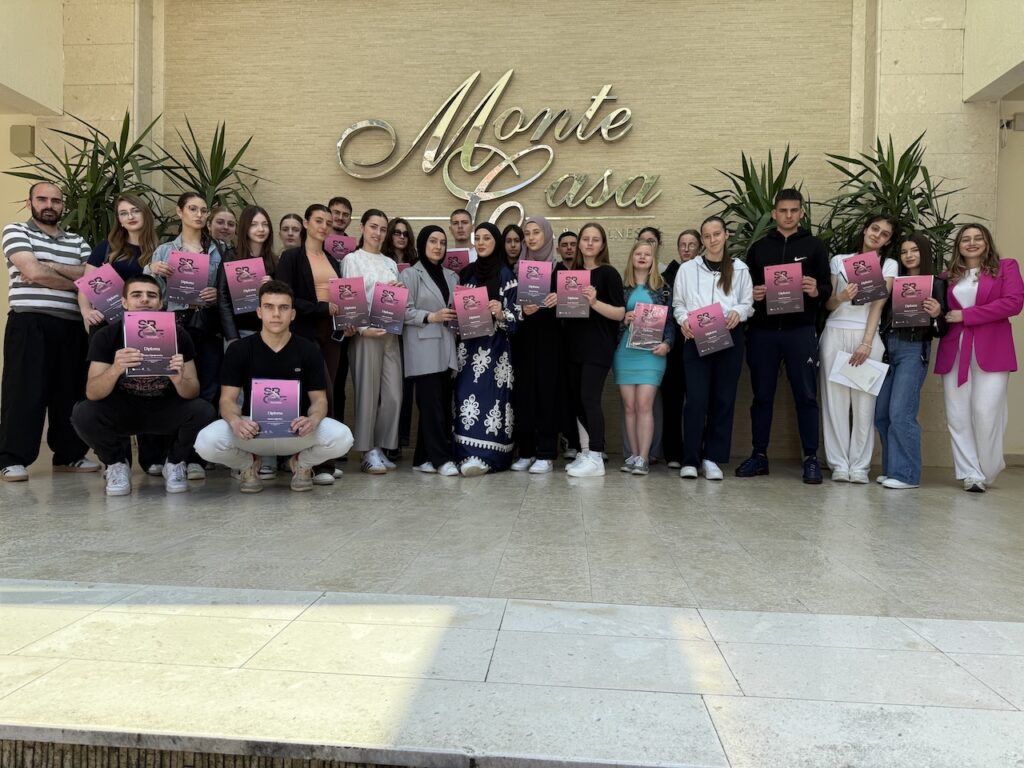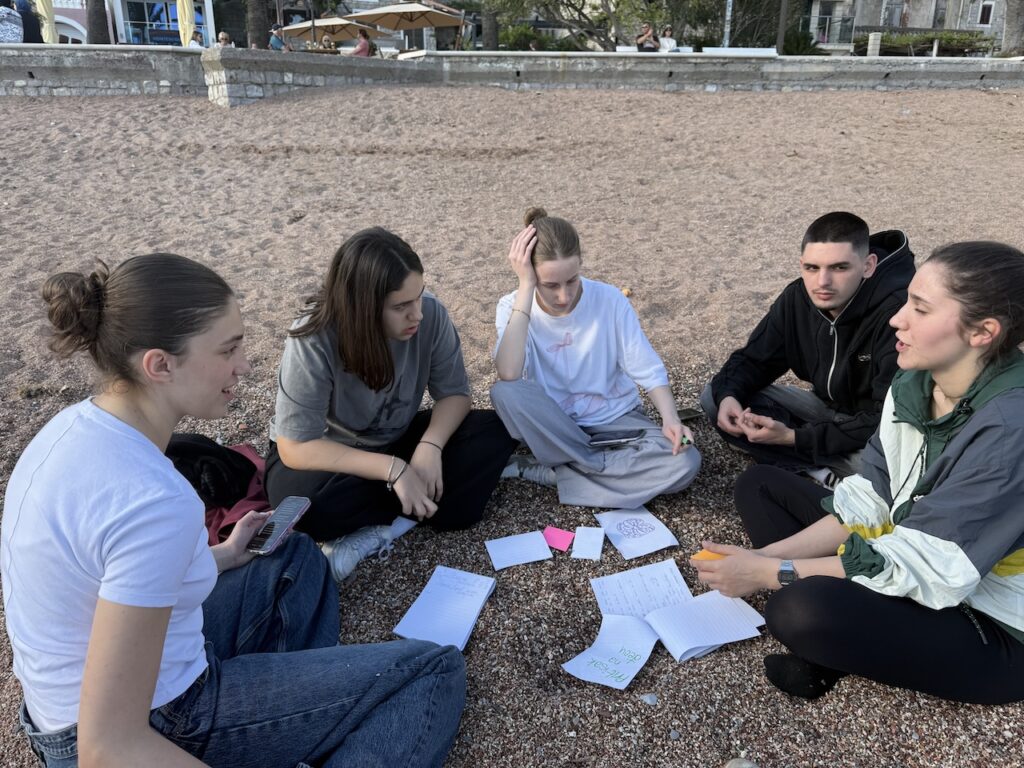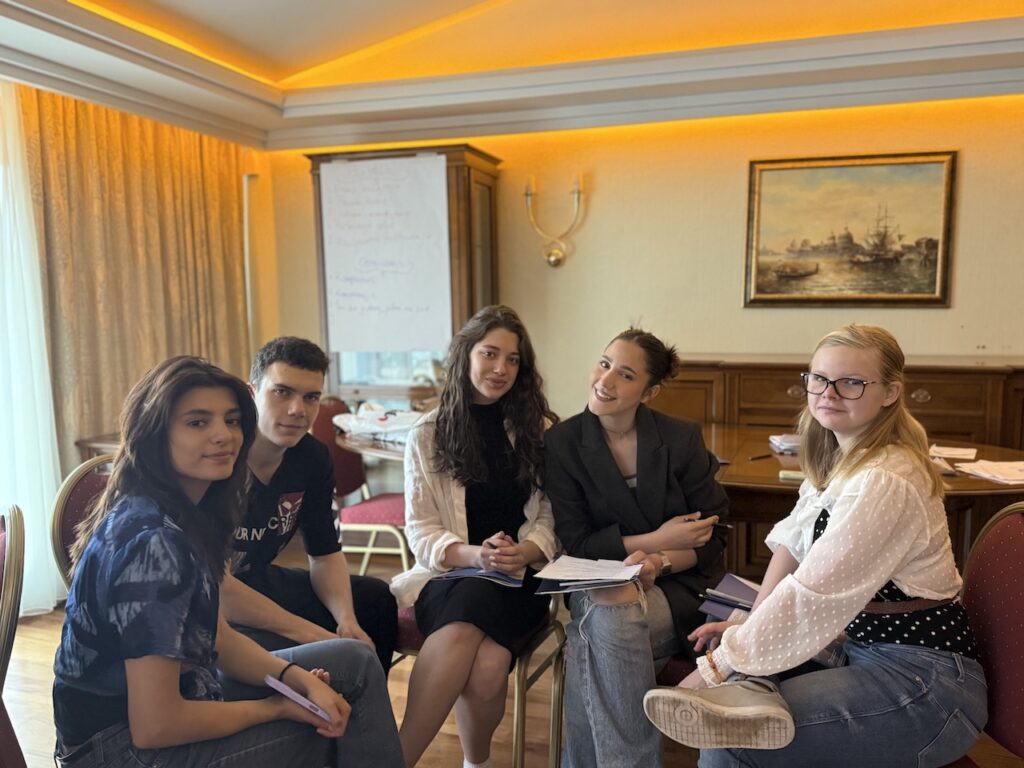Intercultural encounters create space for dialogue, understanding, and personal transformation of youth toward a more tolerant society, was one of the conclusions from the five-day Intercultural Camp for high school students, organized by the Centre for Civic Education (CCE) from 23 to 27 April 2025, in Petrovac, as part of the project “HEART: Helping Empowerment and Resiliency for Today’s Youth”, financially supported by the EU and co-financed by the Ministry of Public Administration.
The Intercultural Camp gathered 25 young people from eight municipalities: Zeta, Danilovgrad, Podgorica, Bar, Plav, Rožaje, Petnjica, and Gusinje. They worked with experts from academia, the formal education system, and the civil sector. The programme covered key topics such as the modern concept of human rights, cultural identity, interculturalism, and explored social media, stereotypes and prejudice, gender equality, radicalization, and more. Sessions were conducted through a dynamic and interactive approach, combining short lectures with workshops, simulations, debates, and open discussions, enabling participants to develop critical thinking through hands-on experience.
“Thanks to the CCE, these encounters provide space for joint reflection and sharing, but also serve as a call to reflect on the past, present, and future. Namely, identifying the intense presence of stereotypes and prejudices in real time and in online spaces, exposing and demystifying them, leads to the spontaneous realization that each of us is capable of influencing ourselves and others and of rejecting imposed toxic attitudes that can lead to inner conflict and conflict with others. Today, young people supported one another, and I believe they will carry that support into their families, schools, and communities”, said Svetlana Jovetić Koprivica, Montenegrin language and literature teacher at “Golubovci” Secondary School, who was one of the lecturers.
“The Intercultural Camp showed how important it is to work with young people on topics of identity, multiculturalism, and mutual understanding”, emphasized Almedina Dodić, Executive Director of NGO Eduko Plus, one of the facilitators. “Young people are often not well informed about their own and others’ heritage, which can lead to misunderstanding and prejudice. Through such programmes, they have the opportunity to learn about different cultures, exchange experiences, and understand that heritage is not static—it constantly evolves. That’s why they contribute to building a more tolerant and inclusive society, and should be continued and expanded”, she added.
“This programme is extremely important because young people rarely have the opportunity in formal education to hear about these topics directly from experts and individuals with lived experiences. The education system does not sufficiently encourage understanding and equal inclusion of all groups, while programmes like this one offer accurate information, raise awareness, and help youth see diversity not just as something to tolerate, but as a value that enriches society”, emphasized Marina Vujačić, Executive Director of the Association of Youth with Disabilities (UMHCG), who led one of the workshops.
“When we talk about intersectionality with youth, LGBTIQ topics are often excluded, leaving young people from this community invisible and unprotected, especially during the period when they are most vulnerable and exposed to peer violence and discrimination. We especially appreciate that the CCE included a workshop on this topic in the programme, which demonstrates a genuine commitment to the inclusion and protection of LGBTIQ youth, recognizing how important such workshops are for their empowerment and for improving their position in society”, stated Marica Vlahović, Head of the Office for LGBTIQ Persons in the Secretariat for Social Welfare of the Capital City.
“At the Intercultural Camp, I had the opportunity to meet amazing people from different regions and cultures, which helped me break down some of my own prejudices. Through workshops and discussions, I learned how important it is not to judge quickly and how diversity can enrich us if we give it space”, said Boško Brajović, a third-year student at the “Vaso Aligrudić” Secondary School of Electrical Engineering in Podgorica.
Svetlana Zabiyako, a student at “Niko Rolović” Gymnasium in Bar, said that the Intercultural Camp was “a place where everyone felt comfortable, and we learned in a fun way through various games and workshops. I think every one of my peers would be interested in learning about interculturalism like this, surrounded by great people and gaining knowledge in such an atmosphere”.
The five-day programme was successfully completed by: Svetlana Zabiyako, Amar Agović, Marijana Lainović, JulijaJoksimović, Vanja Vasiljević, Minela Radončić, Minela Hot, Lina Muratović, Dražen Delić, Jana Jovićević,Jasmina Lika, Helena Stanković, Marija Mia Maraš, Aleksandra Janković, Miloš Ognjanović, Matija Popović, Boško Brajović, Luna Popović, Marija Mirković, Amina Kačar, Binasa Plunac, and Džejla Plunac.
Alma Novalić, Project Assistant



